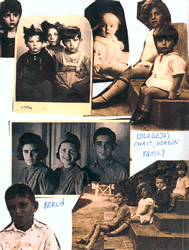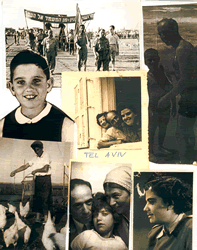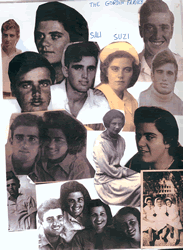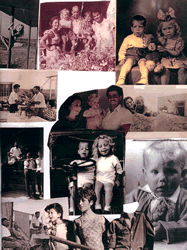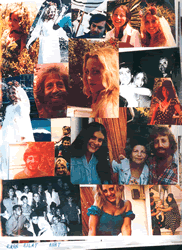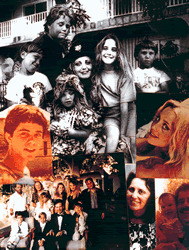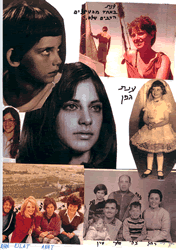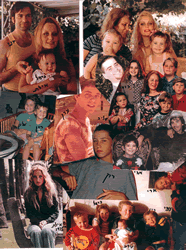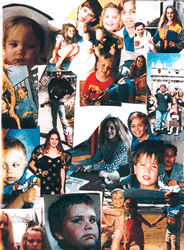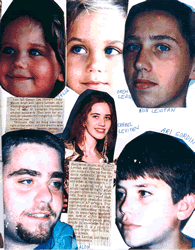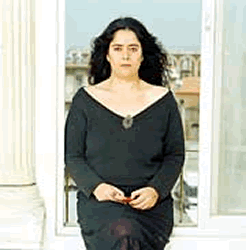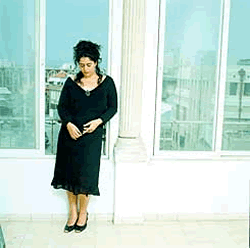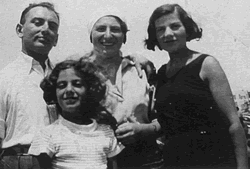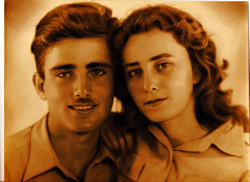#vasfalcg-13:
This article is from the Friday Magazine (May 2, 2003) of Haaretz. It can be found at http://www.haaretz.com/hasen/pages/ShArt.jhtml?itemNo=288850&contrassID=2&subContrassID=14&sbSubContrassID=0&listSrc=Y
Shva Salhoove is the wife of Eran Gordin, grandson of Bela nee Shulman and Meir Gurevich of Kurenets, and Lija (Lola) nee Chait and Salomon Gordin of Lithuania and Latvia.
Life in Venice
By Dalia Karpel
Only
in Venice was writer and poet Shva Salhoove able to free herself from
a tormented childhood and a misguided love. Her new book describes this
marvelous journey.
In May 1999, Shva Salhoove traveled to Venice, her first trip abroad
after 11 years during which she insisted on remaining at home. Salhoove,
39, an author, poet and writer of articles about Israeli art, won a
trip to Venice that year after writing an article for a catalog on an
exhibition by Philip Rantzer and Simcha Sherman, which was on show at
the Venice Biennale. But even in this city of water, as in her life
in Jaffa, Salhoove did not rush to leave the room where she was staying.
"I didn't see St. Mark's Square," she says. "I'm a person
of home and window, and the entire street somehow is enfolded through
the window like an internal landscape. I sat in the apartment in Venice
next to the window, and I wrote footnotes for an essay on Bialik's poetry.
I saw Venice through closed windows."
Her Venice experience turned out to be a personal reckoning and gave
rise to a book of poems, "Ir U'neshia" ("City and Oblivion"),
which is being published this month by Keter publishers.
"Until then I was a person who never comes home, a kind of Odysseus,"
says Salhoove. "I was someone who is always a displaced person.
I invented my childhood in the ma'abara [transit camp] at Akir (today
Kiryat Ekron). I invented an entire world, and entirely erased the reality
of terrible loneliness that I experienced as a girl at the Boyer boarding
school in Jerusalem. I lived inside books for many years, and I denied
that I was a fool for books."
In Venice all her self-deceit dissolved: "I understood that I,
as a woman, cannot leave my home. I am my home, and my home is wherever
I am," she says. "For 12 years I have been living in a certain
apartment in Jaffa, married to Eran Gordin, a clinical psychologist,
and when I would go to visit my parents in Kiryat Ekron, I would say
to him that `I'm going home,' and again and again I expressed signs
of not being settled. In Venice I understood that I have a home and
I have a path, which is not the path of loss."
The work on her book freed her from romantic ideas of unrequited love
and made room for another sort of love: "When you understand that
the breakdown of your ego is the result of a certain set of values,
then you exit from the picture of romantic love," she says, "and
you enter the space where there is a little more life and more reality.
I don't have a child of my own yet. My university studies are my child,
but I am now preparing a place for a child. A place has opened up inside
me."
Salhoove wrote "City and Oblivion" as part of a novel of letters
about a young woman, Anna Brauer, who lived in Berlin in the 1920s,
came to Israel in order to settle here, but after a short stay returned
to Europe. In her letters, Brauer writes poems that she doesn't publish.
Salhoove took the poems that she had written for her heroine and collected
them in her new book of poetry, because "at a certain stage, I
was able to part from the mask and not to be like her, a writer who
doesn't publish." And so the book of poetry describes a tour in
Venice that slowly turns into a whirlpool of memories and passion. Three
axes meet in the book: Salhoove's childhood memories of the ma'abara;
her Jewish-traditional-spiritual world, including her insights about
the ritual infrastructure of Judaism (she is also a doctoral student
in Jewish philosophy); and her strong attraction to Israeli art.
Revolution in the ma'abara
The Hebrew name "Shva" (as in the "queen of Sheba")
was given to her by her parents, natives of Libya. Her family name,
"Salhoove," means "flame." She is stormy, emotional,
a flame. It's somewhat difficult to stop the outburst of words and the
complex sentences that flow from her. Her Hebrew is metaphorical and
somewhat Bialik-like ("I speak a kind of poetic language. I can't
apologize for that all my life"). Her hair is black and flowing,
and her face is full of expression. She smokes Noblesse cigarettes one
after another, and gulps quantities of black coffee. She is a large
woman (after shedding about 15 kilograms this year), wearing a wide
dress with a generous decolletage.
Her parents, Malka and Yosef Salhoove, came to Israel from Libya as
children, moving from one ma'abara to another until they settled in
Akir. Yosef completed his high-school education when he was a first
sergeant major in the Israel Defense Forces; Malka (nee Yamin) studied
only a little, because her father thought that studying was tantamount
to sending a young woman out into bad company.
"Akir had a large community of Yemenites, and the place absorbed
all the tragedy of the aliyah [immigration] to Israel, but also absorbed
Zionism like crazy," says Salhoove. "What people disdain as
Messianism is the most effective Zionism there was and the way to survive
a difficult emigration. In other words, it's a real love of Zion. I
grew up below a military airport, and with every plane that passed and
emitted a sonic boom, my father said that it strengthened his ears."
Her mother Malka was the first revolutionary in the ma'abara. At the
age of 16 she left her father's home and went to learn how to read and
write in evening courses. She also found work and learned to dance.
"As a working girl, they treated my mother in the ma'abara like
a loose woman," says Salhoove. "When one of the women came
to offer her pious son as a match, my mother said to her: `I dance,
I smoke, I work and I like the good life,' and from that moment, all
the women in the ma'abara kept their distance from her. She hasn't changed
- she says that she is 64 years old and nobody is going to tell her
what's good and what's bad. She believes in God, and God believes in
her. When I come to visit and I pester her about Shabbat observance,
she answers, `For you I'm a real secular woman.'"
Salhoove says that what her mother calls "secular" is a person
who is ignorant of halakha (Jewish law): "She is not a scholar,
nor did she compensate herself with evening courses for those who want
to return to religious sources. She doesn't observe Shabbat, but she
votes for Shas, because she believes in God."
Jerusalem played a central role in her parents' faith. "When I
went with my father for tests at Boyer, we went first to the Western
Wall. When they would come to visit me, we would go to the Wall. All
their lives my parents talked about their desire to be buried in Jerusalem.
It came from my grandparents, who were crazy about Zion. For me to be
inside the poetry of Rachel [who wrote during the pre-state period]
is like my father being inside the sacred writings of Begin [late prime
minister Menachem Begin, who led the Etzel pre-state underground] and
inside a prayer book, and within the ethos of sacred Zionist heroism,
with all the symbolism that we identify as chauvinism. The religious
story is a story of Mizrahi [Jews of North African and Middle Eastern
origin] identity."
Salhoove admits that she herself has undergone a change: "For years
I shrugged off the exaggerated simplicity of this sort of religious
nationalism," she explains. "Today I don't hesitate to call
it nationalism. When I was 13, there was a simulation of an election
campaign at Boyer, and each of us represented a different political
group. This enlightened me, and I understood that my parents were fascists.
It caused harsh quarrels between us, and in recent years I have understood
that that is no way to talk to one another.
"As long as I can remember myself I've been religious. My father
is very religious, and I have always identified with him. From a young
age I was aware of the battle between him and my mother on the subject
of religion, and I always sided with him. She traveled on Shabbat and
watched television, and he observed Shabbat zealously. From childhood
I've been enchanted by the aesthetics of religion. The synagogue was
the most beautiful place in my eyes. A world without ceremony is a nightmare.
I don't come to exhibition openings because I don't see that as ceremonial.
I was drawn into faith in the simplest way.
"I live with a husband who is a scion of the Third Aliyah [a wave
of immigration to Israel from 1919-1923]. His forefathers were atheists
who established Moshav Bitzaron. To him my faith is as strong and profound
as his faith in the freedom of man without a god, in man as the writer
of law. The question is, in whose hands is the law? `In the hands of
Rav Ovadia' [Rabbi Ovadia Yosef, the spiritual leader of Shas] is an
answer that convinces me. And my husband Eran also has a convincing
answer. I can say that the positions of each side demand an entire world
and can exist together in the world of the Holy One, Blessed Be He."
Child with dreams
Salhoove was an exceptional child, the middle of three children in the
family. "I knew how to read at the age of three and a half, and
a year later I knew how to write, and at the age of five I forced my
poems on the kindergarten teacher at kabbalat Shabbat [a ceremony for
welcoming the Sabbath]. I expected praise, but the reaction of the children
was sharp and hostile opposition. In fifth grade an entire class didn't
speak to me."
When she was 12, her parents decided to send her to study at Boyer,
which had a reputation for having many gifted students.
"I was a child with many fears and many dreams, and I grew up in
a protective family. To come to Boyer without previous preparation was
terrible. In the middle of eighth grade, I was terribly homesick and
my parents didn't let me return, claiming that there was no academic
high school in the area, and there really wasn't. To send me to the
boarding school was part of being accepted by Zionism, an involvement
that is expected for a Jew in the Land of Israel. So my parents didn't
have many children. They chose the path of modernization, and as luck
would have it, this rift took place for me at the height of such meaningful
cultural formation. My younger brother, who was born in 1971, was already
in the first group of children from Kiryat Ekron who weren't sent to
a boarding school far from home, but studied in the regional high school."
Salhoove's life at Boyer was not easy. On the one hand, she decided
to stifle her homesickness in order to succeed there; on the other hand,
she was independent, opinionated, rebellious. In 10th grade she gave
up and returned home. She couldn't bear the conformism, the education
toward self-sacrifice for the homeland. She completed matriculation
and was drafted.
During her military service as a reporter for the army magazine Bamahaneh,
she wrote under an assumed name, Bracha Peled, for Haaretz Magazine,
which was then edited by Meir Schnitzer. Later Salhoove wrote about
theater for the now-defunct Hadashot. Journalism was her heart's desire,
but she didn't get a job and had difficulty making a living as a freelancer.
In 1986, she began to study cinema at Beit Zvi, left and went into a
crisis.
"I understood that I could supply a good journalistic piece only
once every two months, and then I went to Amsterdam and got stuck there
for two months, and wrote a wonderful story. After two years I understood
that the horror known as `a film budget' was not for me, and that the
only thing I wanted to do was to write. I also understood that the only
horizon for a person like me was a Paradise-like prison, which is the
university."
Was this also an emotional crisis?
Salhoove: "I had a crisis in Tel Aviv that lasted about a year.
I didn't do a thing. We lived on Luntz Street, and all my friends lived
near Sheinkin, and for me everything lost its flavor, and I knew too
many things. I had to tie up all the loose ends and leave secularism.
The option of myself as a person who determines his fate with some kind
of complete freedom, that was over. If I was going to study at the university,
I was going to study Jewish philosophy. I started in 1992, and I'm now
working on my doctorate, about the transition, in the wake of the destruction
of the Temple, from the religion of the Temple to the Mishnah, to the
religion of the Sages."
`Agent of modernization'
After overcoming the crisis, she returned to her mother's house. It
was no longer the house in the ma'abara, which she had missed so much
at boarding school and which was located in a beautiful Arab fruit orchard
with a plethora of loquat, lemon and berry trees, near the tremendous
orchard of Moshav Bilu, surrounded by huge cypress trees.
"I remembered that there was no end to the beauty. My father fenced
in a plot of land near the house and raised vegetables and flowers.
People lived in the huts of the ma'abara until the 1970s, because they
hoped to stay on the land and to keep their small plots of land. The
only one who wanted to leave the hut was my mother, who dreamed about
an apartment in a housing project."
Her mother, says Salhoove, was the first "agent of modernization"
in the family: "With the first money that she earned from her work
as a cleaning woman, she bought an electric mixer and a washing machine.
She stopped making couscous, because the preparation takes half a day.
She took upon herself the management of the house, and because of her,
[my parents] live today in a private house of 400 square meters with
a garden. She played the stock market with the salary of a first sergeant
major, and built a house that is an expression of Mizrahi luxury: three
guest rooms, two American kitchens, drapes all over and six-kilowatt
lamps."
In that house, lamenting the beloved hut of her childhood, with a whole
floor to herself, Salhoove sat at the age of 26, after the emotional
crisis in Tel Aviv, and wrote her first book, "Onat Hameshugaim"
("April Season"). The book was dedicated to a soul mate from
Boyer, Moshe, who committed suicide at the age of 27 by injecting air
into his veins, after years of failing to adapt to various Israeli frameworks.
Salhoove wrote the book in such a way that the hero doesn't even acclimate
to the mental institution, where the nurse says to him, "First
of all, start keeping to a schedule."
Salhoove, fortunately, had a home to return to. "It's possible
that had I been a man, I would have been forced to find myself without
a livelihood and without assets that guarantee me the ability to write,"
she says. "I returned to my parents' home in 1986, and for three
years I wrote on a balcony that overlooks the lawn and the dew."
Even today, she claims, she isn't preoccupied with finding work, which
leaves her time for writing."
You're still somewhat spoiled, aren't you?
"I see myself as a person who has given up all luxuries. I have
no driver's license and no cell phone. I don't buy anything that isn't
for my studies. Every cent I get for writing articles for catalogs or
for art books I spend on cigarettes. The way in which I am dedicated
to writing allows me to feel that it's all right that my husband supports
me. My older sister worked hard to achieve financial independence, and
she built up a business and traveled all over the world. For me, these
things aren't an option. I am completely taken up with studies and with
writing. I can't say that I'm more spoiled than my sister, because I
never wanted the kind of effort that leads to financial independence.
For me, a book is a goal. The doctorate and the writing are the goals."
What are you trying to do in your writing?
"To purify and to describe. There is something in the metaphor
of purifying dishes in honor of Pesach. My life has a tendency not to
lose anything, and writing is the place where I can feel. You really
are writing for people whom you love and you are with them when you
write. It's a space of presence. And when I open the Mishnah tractate
Ta'anit, which is the main topic of my doctorate, or when I peruse a
book by Gershon Scholem, it's like being in an empowered space of life.
"I define myself as an author, and I claim that a Hebrew author
writes in the language of poetry. The word `soferet' [author] suits
me, because it's connected in Hebrew to `sefira' [counting]. The Bible
was sealed with its letters: Everything was counted, and from that point
of view, I am faithful to the word `soferet' - even when I write an
essay, when I do research and when I write what are called poems. The
place to which I aspire is the place where language is life."
Living from rumors
In her other field, Israeli art, Shva Salhoove has written about artists
such as Arie Aroch, Danny Karavan, Rafi Lavie, Nurit David, Yehudit
Sasportas, Avner Ben Gal.
"All my tremendous love for cinema, and for the place of plastic
imagery, and for the enigma of the picture - all that has been concentrated
for me into a great love of art," she says. "From the first
article that I wrote for Studio in 1993, I have focused on the duality
of Israeliness and Jewishness, Mizrahi and Ashkenazi qualities, femininity
and perversion, culture and taboo, everything that interests me, and
I was able to bring in my love for journalism and cinema."
Writing about art, she says, means also "being inside the most
profound rift of Israeli life: the rift between Jewish identity and
Israeli identity and the strange, monstrous link that is created between
these two identities. The tension between the Mishnaic utopia and the
fragments of the Zionist utopia is the tension to which I return when
writing about art."
When she speaks of a Jewish state, says Salhoove, she is speaking about
"a hope for a possible perfect order. But at the same time, I am
speaking about the infinite rhythm of this event. There is no reason
to hasten the end. Zionist created a Messianic moment, a catastrophic
moment of apparently complete fulfillment of the Messianic dream. We
are living every day with the destructive consequences of that miracle.
I think about it, I look at it, I can't do anything but write and describe
what I see, about the scorched land, the land of the Palestinian and
Israeli sabra, which has become a foundation for death. I'm writing
about that now for an exhibit by Karavan in Valencia."
But you emphasize that you are very optimistic.
"I live in Jaffa in a mixed building, and my perspective of our
conflict with our Arab neighbors is not only of the last two years of
struggle over the divine image. It's a struggle that has been going
on since the sixth day of Creation, and always in shameful circumstances.
The first murder was the murder of one brother by another, and that
doesn't dull the horror of the present. It only shows you how much of
a luxury despair is. Jaffa is an occupied city just as much as is Beit
El [a city in the West Bank], and the mission of the return to the land
hasn't ended yet, and we are in the midst of the terrible battle it
causes. I can't give up and say `We have lost the divine image.' We
still have something to lose.
"Now we can still do justice by the Palestinians. We have to reach
negotiations when the door is still open. We mustn't fall into the entirely
black picture, because then it allows all the blood. Despair always
gives rise to more despair, and to draw the political picture in the
country as though hatred and the occupation have won, and we will remain
under siege forever, is a picture that I'm not willing to accept, neither
from the right nor from the left."
Does the Mizrahi Democratic Rainbow [an organization demanding equal
rights for the Mizrahi community] fascinate you?
"I'm not suited to the Mizrahi Democratic Rainbow. I have nothing
of hatred, not for Ashkenazim, not for Zionism and not for Ben-Gurion
[Israel's first prime minister]. I am not post-Zionist. I want justice
for all. The members of the Rainbow have embarked on a struggle over
state lands, and over public housing and over education, and they are
engaged in important social campaigns. To belong to such a body is to
belong to a political family, whereas I belong to the family of one
Jewish people."
Why do you cut yourself off?
"I went and cut myself off from any encounter with machoism. I
have a greengrocer named Abed, and I travel to the university, and all
the Israeliness within which people wage war in built-up areas in their
everyday lives, and don't differentiate between the war in Gaza and
the narrow aisle in the bus - is very difficult. People here for some
reason are sure that they have a right to break in forcibly everywhere.
I have stopped dealing with that. It's an eternal price that we are
paying for the barbarism of modernism, as Walter Benjamin said."
Since the murder of Yitzhak Rabin, you don't watch television.
"Nor do I read newspapers, I live as in the past, from rumors.
My husband Eran reads newspapers and watches television, and I can draw
what I need from him."
#vasfalcg-15:
Rachel (nee Gurevitz) and
Salee Gordin
Tel Aviv, 1947 LINK
